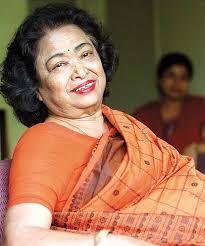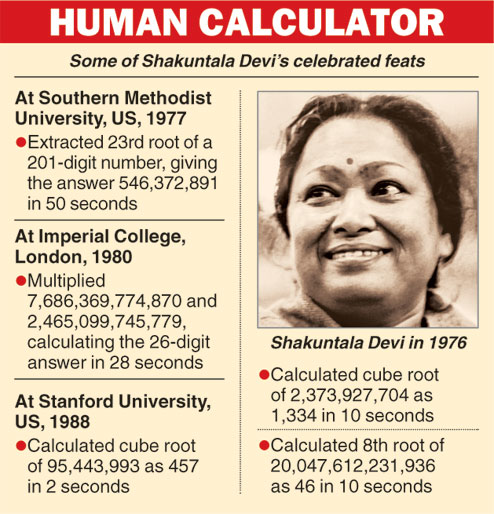Can you find the cube of a 100 digit numbers? Can you do it without a calculator? Those types of equations are a walk in the park for these mathematical prodigies, noted today by a Google Doodle in honor of Indian 'human computer' Shakuntala Devi.
Devi, the magician of numbers and so-called “human calculator,” is honored in a Google Doodle this afternoon. Ms. Devi, who died in April, would have been 84-years-old today. Devi was born in Bangalore, India on Nov. 4, 1929. Her father was a circus acrobat and,  upon finding that his daughter was at just three-years-old an obvious mathematical savant, soon began organizing road shows to showcase her unusual talent for numbers.
upon finding that his daughter was at just three-years-old an obvious mathematical savant, soon began organizing road shows to showcase her unusual talent for numbers.
Like her father, Devi emerged as an adroit performer, but with a twist: her displays of cerebral somersaulting were, well, cerebral. There was nothing to see but Devi deliver the final answer, before the public had even managed to take that breath of anticipation – would she be able to answer? Would she get it right? Despite the invisibleness of her act, or perhaps because of it, her almost magical performances of computational adroitness held audience’s un-yielding attention.
News soon spread that there was a young woman in India who had a brain so agile with dates and numbers and equations that it had to be seen to be believed. At six-years-old, she performed her numerical magic at The University of Mysore, in India. In the 1950s, she was invited to tour through Europe and the US. In the 1970s, she was invited back for the performances that, it would unfold, would put her in the history books.
Watch This One-on-One Interview with Devi in China
[youtube id="l0fXPzcbmPk" width="600" height="350"]
In 1977, Devi appeared at Southern Methodist University, in Dallas, Texas, to extract before an audience the 23rd root of a 201-digit number. It took her 50 seconds. The Univac computer, set up as her competitor, took 62 seconds, the New York Times reported.
<!––nextpage––>
In 1980, at the Imperial College in London, Devi multiplied two 13-digit numbers in just 28 seconds, a record-breaking speed that was recorded in the 1982 Guinness Book of World Records. The two numbers were 7,686,369,774,870 and 2,465,099,745,779; the answer was 18,947,668,177,995,426,462,773,730. Her response time, less than half minute, included the time it took her to say out loud the answer.<a href="http://desihiphop.com/wp-content/uploads/2013/11/devi2.jpg">
"Numbers have life, they're not just symbols on paper," she once said, the London Telegraph reported.
Devi’s talents extended well beyond adept numerical footwork – she was, as observers often noted with blatant surprise, a socially adept person.
“The first thing most observers would notice about Devi is that her general appearance and demeanor are quite the opposite of the typical image of the withdrawn, obsessive, autistic savant, so well portrayed by Dustin Hoffman in the recent motion picture, Rain Man,” wrote Arthur Jensen, a researcher at The University of California, Berkeley, who studied Devi’s abilities, in a 1990 journal article.
“Devi comes across as alert, extraverted, affable, and articulate,” he said. “To all appearances, the prodigious numerical talent resides in a perfectly normal and charming lady.”
During her life, she published almost a dozen books, most of them about mathematics. Her writing also included a 1977 book on homosexuality that was widely considered a pioneering move in conservative India, calling for total acceptance of homosexuality in the country. She later said that the book was a compassionate response to her failed marriage to a gay man.
